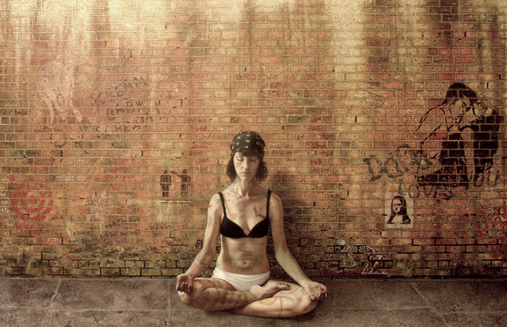Bruno Capolongo 2011 Invitational Juried Exhibition
Hamilton Conservatory for the Arts Gallery, Hamilton, Ontario
‘Contemplation’, oil on canvas, 32” x 48”, First Prize Award
Introduction by the Curator
It is well known that to discern the general intellectual, moral and cultural climate of an era is possible through the window of the arts. I think Luciani’s ‘Contemplation’ is just such a painting, a pane of glass in a window to our time.
The urban context for this scene is that of a vandalized brick wall and pavement. The sole figure, a young woman in meditation, sits in the lower centre. Like the wall itself, graffiti of sorts riddles the canvas of her body. Worn and scarred, she sits as one snared by the spurious glitter of pantheism, striving to transcend, to fill that God shaped void. It is a picture of deep longing.
She is not nude, but in a sense she is naked before all who gaze upon her, and her scars, those of true consequence, are etched not on flesh, but seared in memory and soul. So she sits, consumed in her vacuous pursuit, a wandering soul, not once lost, but lost still.
When I first saw the painting I immediately thought of it as emblematic of how we in our relativistic, post-Christian West have embraced Pantheism, existentialism and a make-it-up as-you-go spirituality. And while the painting is complex, eliciting an entirely different response in some, for me it brings to mind the word’s of G.K.Chesterton, with which I will conclude my remarks about the painting.
Chesterton, one of the great minds of his day, observed that: “The danger of disbelieving in God is not that [we] will believe in nothing; alas, it is much worse, the danger in disbelieving in God is that we’ll end up believing in just about anything.” - Bruno Capolongo
Hamilton Conservatory for the Arts Gallery, Hamilton, Ontario
‘Contemplation’, oil on canvas, 32” x 48”, First Prize Award
Introduction by the Curator
It is well known that to discern the general intellectual, moral and cultural climate of an era is possible through the window of the arts. I think Luciani’s ‘Contemplation’ is just such a painting, a pane of glass in a window to our time.
The urban context for this scene is that of a vandalized brick wall and pavement. The sole figure, a young woman in meditation, sits in the lower centre. Like the wall itself, graffiti of sorts riddles the canvas of her body. Worn and scarred, she sits as one snared by the spurious glitter of pantheism, striving to transcend, to fill that God shaped void. It is a picture of deep longing.
She is not nude, but in a sense she is naked before all who gaze upon her, and her scars, those of true consequence, are etched not on flesh, but seared in memory and soul. So she sits, consumed in her vacuous pursuit, a wandering soul, not once lost, but lost still.
When I first saw the painting I immediately thought of it as emblematic of how we in our relativistic, post-Christian West have embraced Pantheism, existentialism and a make-it-up as-you-go spirituality. And while the painting is complex, eliciting an entirely different response in some, for me it brings to mind the word’s of G.K.Chesterton, with which I will conclude my remarks about the painting.
Chesterton, one of the great minds of his day, observed that: “The danger of disbelieving in God is not that [we] will believe in nothing; alas, it is much worse, the danger in disbelieving in God is that we’ll end up believing in just about anything.” - Bruno Capolongo

